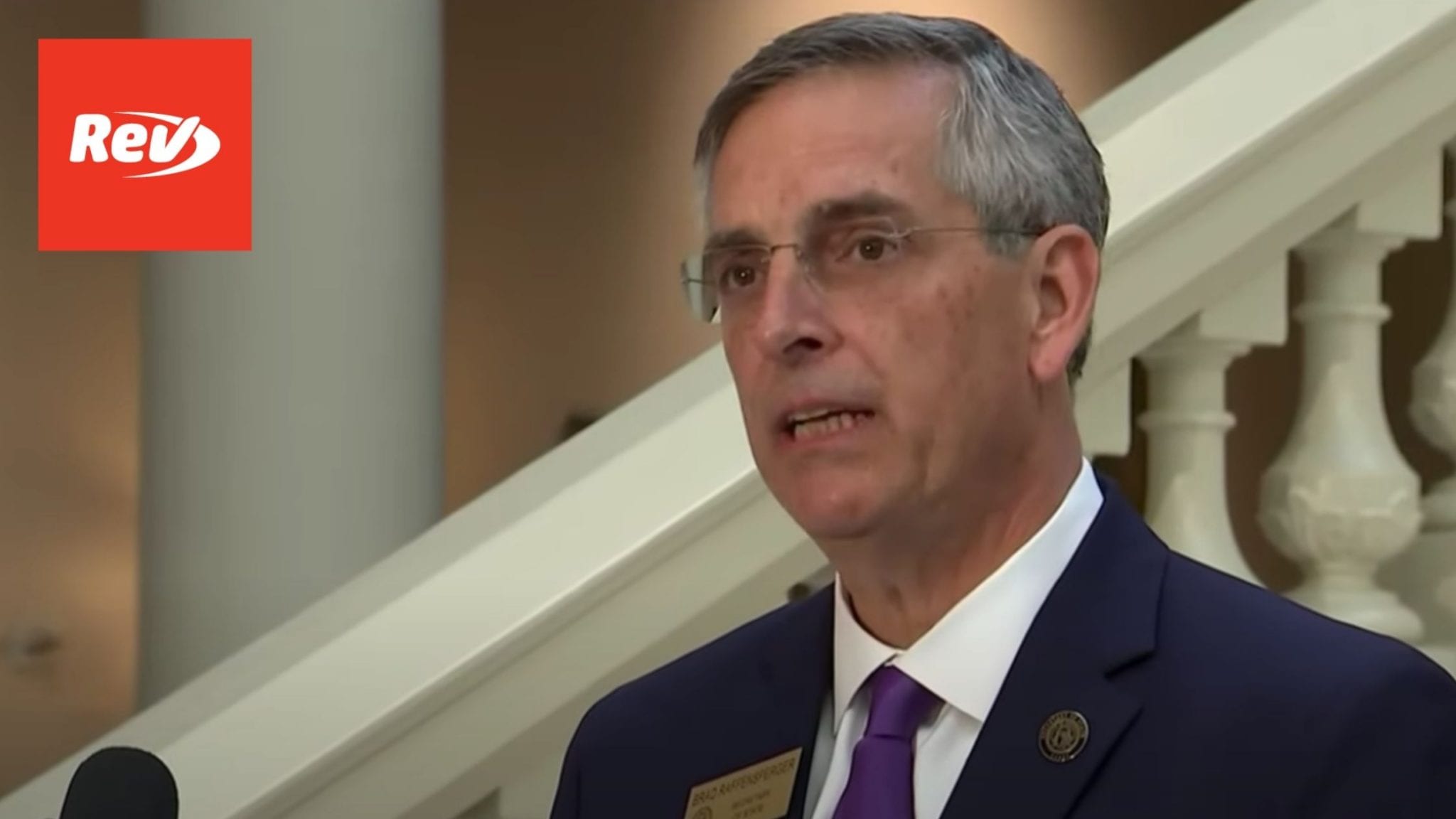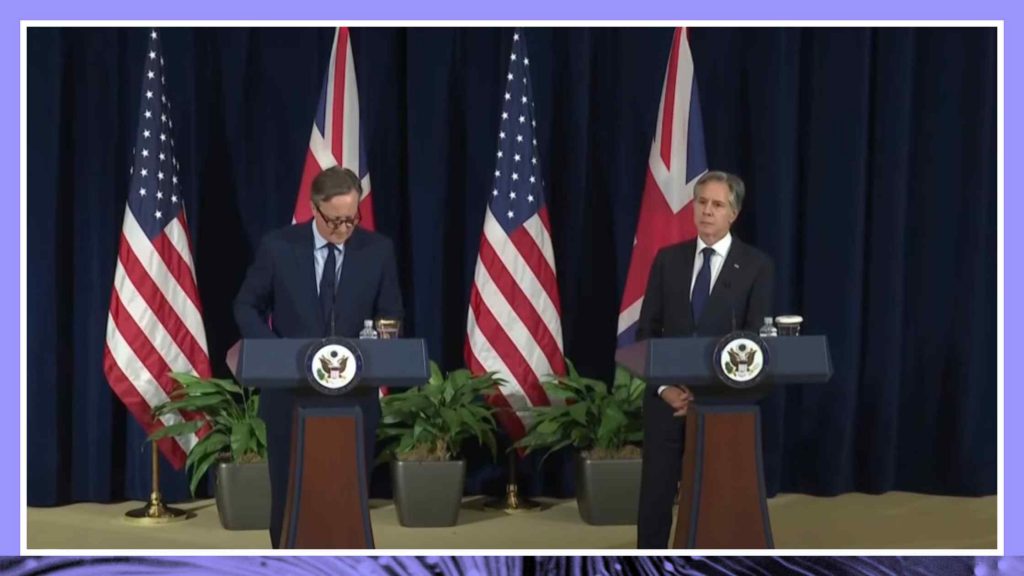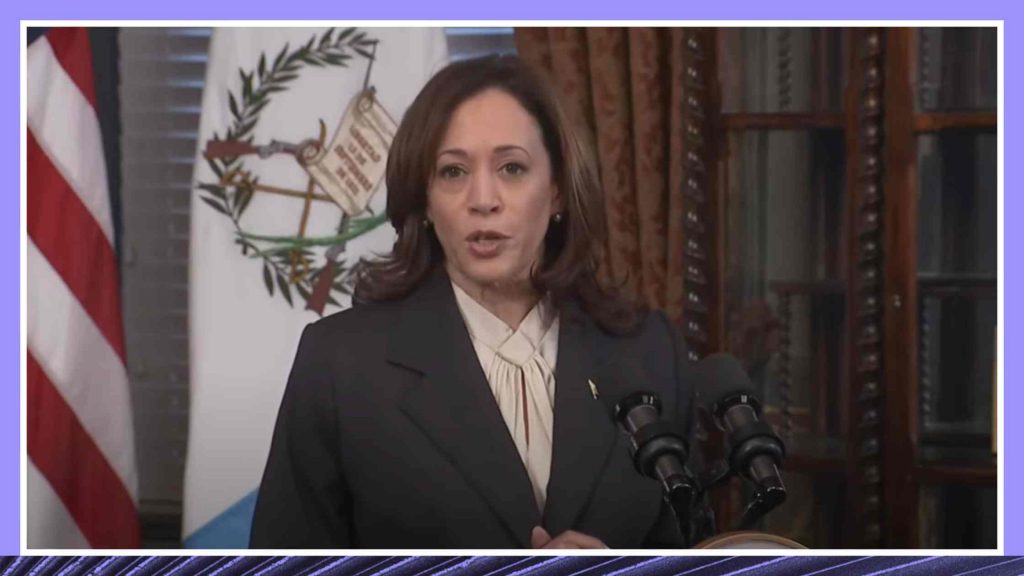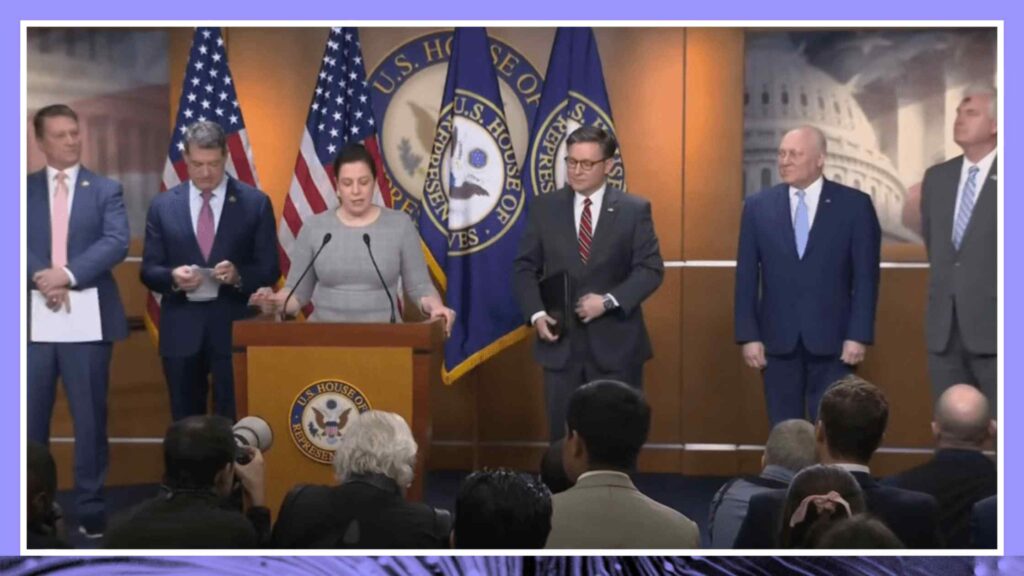Nov 4, 2020
Georgia Officials Press Briefing on Election Vote Count Transcript November 4

Georgia Sec. of State Brad Raffensperger held a news briefing to provide updates on the election voting count on November 4. Read the transcript of his press conference here.
Transcribe Your Own Content
Try Rev and save time transcribing, captioning, and subtitling.
Brad Raffensperger: (00:01)
We’re starting the day off right. Anyway, welcome, everyone. I know that every one of you have had long nights, and probably early mornings. We’re excited to report that the people of Georgia have spoken. It has never been easier to vote in Georgia. Elections matter. We held an election that was a safe, sensible, and responsible election for every eligible voter to access. Your vote counts.
Brad Raffensperger: (00:33)
Perhaps for the first time, we had an election day in Georgia where the wait times were below 10 minutes across the state, and we did that while experiencing record-breaking turnout, handling unprecedented numbers of absentee ballot requests than ever before, implementing a new voting system, and adapting to the requirements of holding an election during a pandemic and recruiting new poll workers. Elections matter and that was a total team effort.
Brad Raffensperger: (01:05)
First, I’d like to thank every early voter who heard our call and voted early. You are the reason why Georgia had success. Thank you to every election official who met every struggle and every challenge. In the middle of a pandemic, it was tough, and we’ve overcome all the challenges. Great job. Thank you. Your vote counts.
Brad Raffensperger: (01:30)
As we also pointed out, it is counties in Georgia that actually administer the elections. And all Georgians owe a debt of gratitude to those dedicated public servants across the state who executed their duties well, and in most cases, flawlessly. Over 50,000 Georgians stepped forward to man the polls in their communities after many of our long time workers had to step out because they were in a population that was vulnerable to COVID.
Brad Raffensperger: (02:02)
Our job isn’t done yet though. And I want to thank my Deputy Secretary of State, Jordan Fuchs, for leading a great team, leading on our public service announcements that helped shape and change voter behavior from in-person voting to early voting. To Gabriel Sterling, who managed the implementation of the state’s new voting system, the largest of its kind in the history of this country. And thank you to Ryan Germany, and for protecting our state law. Judges are not legislators. Jordan, Gabe, and Ryan, thank you. You are tireless professionals who are proudly serving Georgia. And lastly, I would like to thank my entire team in the Secretary of State’s office for their tireless work throughout the entire year. Elections matter.
Brad Raffensperger: (02:52)
Counties made sure that voters had access to many early voting locations, including mega sites, like the State Farm Arena, over a three week period. Your vote counts. I’m happy to report that voters have responded favorably to using our new ballot marking devices. They found it easy to use, appreciated the security of a paper ballot, and liked seeing their ballots tabulated by the scanner. This election puts to rest the debates inflamed by those in our state, or not in our state, who have looked to sow doubt about our systems and those who have wrongly claimed there’s a lack of access to voting. Elections matter.
Brad Raffensperger: (03:37)
Completing this general election is a huge hurdle crossed, but it’s far from the end of our work. We will have, immediately starting today, working towards certifying this election and then preparing for state and local runoff elections on December 1st. And then the September Senate runoff election between Senator Loeffler and Raphael Warnock on January 5th.
Brad Raffensperger: (04:04)
This will require a monumental effort, because we have a short window to get out absentee ballots for the December runoff, to give voters time to return them. My team has sent reminders to counties to get all, let me repeat, all of our results counted today. Every legal vote will count. I know that many of you probably have some questions. Justin.
Justin: (04:31)
You’re a supporter of President Trump, and you’re also the state’s top elect official, what do you say to people who hear the president speak and are worried that votes counted today, votes counted after Election Day, aren’t [inaudible 00:04:41].
Brad Raffensperger: (04:43)
Well, I want everyone to know, in the sound of my voice, that every legal vote in Georgia will count. And right now we have about 200,000 ballots that are left to be counted. With the absentee ballot process, counties worked on scanning those, as many as they could. And then they’re also about 40 to 50,000 early votes that need to be counted. Every legal vote will be counted.
Justin: (05:03)
So is the president correct then?
Brad Raffensperger: (05:05)
We are saying that every legal vote will be counted in Georgia because that’s our process. We follow state law.
Speaker 3: (05:11)
I hear you say that you want counting to be done today. Is that realistic in counties with tens of thousands of outstanding absentee ballots, counties [inaudible 00:05:20] elections? I don’t know if they’ll get it done today. I know you’ve said you communicated with the counties asking them to complete it today, but is that actually possible?
Brad Raffensperger: (05:31)
We’re pushing really hard for that. If we don’t get it there but we get the number so small that then there’s no question of who actually the winner is, I think that’ll be helpful. Really remove a lot of those questions that people might have. Yes ma’am.
Speaker 4: (05:44)
When will you make a decision about which race to do a risk limiting audit on?
Brad Raffensperger: (05:48)
That’ll be something I’ll get with our election team and we’ll get that out as soon as we have that information.
Speaker 5: (05:53)
There’s word that USPS was supposed to do a sweep of their facilities, make sure all the absentee ballots have been delivered, and that in some places that didn’t take place. Do you know if that happened here in Georgia? Is that any concern?
Brad Raffensperger: (06:05)
Well, it would always be a concern. We want to make sure everything gets to us. Don’t have anything specific on that. But that’s why we also instituted the absentee ballot drop boxes. Our concern actually was that voters would wait too long and then it’d be too late to mail. And that’s where we had the absentee ballot drop boxes, which was very well received by voters in Georgia.
Speaker 5: (06:25)
So you don’t have the word that that took place then?
Brad Raffensperger: (06:27)
Yeah, I don’t have anything specific, but as soon as we do, we’ll circle back and get that information out to you.
Speaker 6: (06:32)
[inaudible 00:06:32] quick follow up about-
Brad Raffensperger: (06:33)
Can I get with this ma’am?
Speaker 7: (06:34)
Do you have the breakdown of what counties still need to count their votes?
Brad Raffensperger: (06:38)
Well, it’s several counties, but we know that DeKalb, Fulton, Forsyth, has 7,000 voters. It’s something when you have such a large number of absentee voters and then you have some early votes, it’s really multiple counties. We’re just knocking those down one at a time.
Speaker 8: (07:02)
Sir, can you speak to the process of absentee ballots. I know the timing’s kind of a moving target [inaudible 00:07:02] today. But for those who maybe wondering why they’re not done, can you speak to the delay, the difficulty of absentee ballots?
Brad Raffensperger: (07:11)
So, the State Election Board gave the counties the authority that they could begin the process of scanning the absentee ballots, which is very helpful. So I know that down in Muscogee County and Richmond County, they were really current with everything they had received. But then all of a sudden we also had additional ballots come in on Monday and then Tuesday, so they’re being dropped in. So they had to scan those. And so they’ll be getting that as soon as they can, but it is a two-page ballot. It just takes longer to get those ready for the scanning process. Is there another question back there?
Speaker 9: (07:41)
Secretary, are you able to provide us a breakdown of which votes are [inaudible 00:07:46]?
Brad Raffensperger: (07:49)
Well, I know that right now that we have… My numbers here were 52 to 54,000 in DeKalb. Right now we have 74,000 approximately, Fulton County absentees. And 43,000 early votes in Fulton County. And I have about 7,000 right now, Forsyth. We can get you the entire list, make sure we include all the counties.
Speaker 10: (08:15)
Secretary, can you talk through what the rest of the election process look like from the military ballots coming in to the audit certification process? What’s the next part before we can say Georgia’s certified?
Brad Raffensperger: (08:28)
Well, the next process obviously will be, make sure we get all the ballots counted, then also the [inaudible 00:08:34] overseas military ballots, to get those in and have them incorporated in the vote totals. We’re going to begin the risk-limiting audit process later this week, which is really important. So many people are not aware of that. This is the first time we’re doing a state-wide audit.
Brad Raffensperger: (08:52)
First of all, I think we a higher confidence of voters. I know there’s a lot of information out there, a lot of misinformation out there, and some of it’s just lack of knowledge, and we understand that. And that’s why the risk-limiting audit, what that will do will verify results. So if there’s a race that was, say reported a 51-49, when we do the audit then we can verify what the result is and we have over a 90% confidence level. That gives people additional assurance.
Brad Raffensperger: (09:16)
I think also having that paper ballot, voters were very comfortable. They just gave him that comfort feeling. They looked at it before they cast their ballot. And that’s a good thing also. Then by Friday, November 13th, we then will have the certification. So nothing is certified until after we do the risk-limiting audit.
Speaker 11: (09:36)
And then with the presidential race probably going to be so close, and even some [inaudible 00:09:41] within the margin, can you talk about what the procedures are [crosstalk 00:09:45]?
Brad Raffensperger: (09:45)
Well, if there was a race that was in half percent, it is your right as the candidate that is close but not over the top, that you can ask for a recount. So that we actually could have a request for say, a state representative, County commission race, or any race that’s within half percent. And we’ll just wait till we get every ballot counted. And that’s why it’s very important we follow through the process.
Speaker 11: (10:07)
What does that process look like with the new voting [inaudible 00:10:09]? Will it be a hand?
Brad Raffensperger: (10:11)
No it’ll be actually pulling out, running those through, and then it’ll be actually seeing where that brings us, and then you’re looking at the words that are on the ballot at some point.
Speaker 12: (10:20)
Mr. Secretary, can you explain what you know about what’s happening in Gwinnett County? Apparently they’re having some issues with scanning, or they may have to re-scan thousands of ballots.
Brad Raffensperger: (10:30)
Well, if they do, they’re follow through that. That’s the advantage of having the verifiable paper ballot, that you can re-scan that. So that’s why if some of the ballots do kick out. And the reason they kick out is everyone, if they don’t fill out the ballot correctly or they put an X or they circle a name, that’s why we have the adjudication panels for Republican, Democrat, and then the election official, to have three sets of eyes on there to verify that. So we want to at least be a two, one adjudication vote on each ballot so we can make sure that we capture the correct voter intent.
Speaker 13: (11:04)
If there are legal challenges made to votes cast before 7:00 yesterday, absentee ballots, will your office and the state defend those ballots against legal challenges?
Brad Raffensperger: (11:15)
Yeah, we want to make sure that we follow state law. We’re always going to look at what is the state law. And that’s why Ryan Germany, our legal counsel, can answer any legal questions you have. We want to make sure the law is very clear and we follow the state law and we don’t believe that judges should legislate.
Speaker 14: (11:38)
Can we just get a quick assessment from you of the timing [inaudible 00:11:39] county? Is this taking longer than you expected to take, and why?
Brad Raffensperger: (11:39)
Oh no, it’s really going much quicker. And that’s why we’re really pleased with the State Election Board allowing us to scan that. If you look at some of these states, this morning is when they actually opened up their absentee ballot boxes, and that’s when they started actually the process of separating out absentee ballots. That’s a very extensive process, verifying the signature and going through there, separating it out. We have saved days and days. You’re going to be waiting a long time at some of these states, much to many people’s consternation, because we understand it’s a close election.
Speaker 15: (12:09)
So you’re saying this is right on schedule?
Brad Raffensperger: (12:10)
Yeah, we’re doing fine. And we’re really pleased with… We’ll be off everyone’s radar and they’ll be worried about the states up north.
Speaker 16: (12:17)
Your website doesn’t keep up with the absentee ballot, the [inaudible 00:12:20].
Brad Raffensperger: (12:20)
Right. Yeah. As it’s getting reported, then it’ll be just added to that total.
Speaker 16: (12:24)
So how do private citizens keep up with that?
Brad Raffensperger: (12:28)
It’s a process and we just keep on adding that. And then eventually when we have them all done, we’ll notify, or put a note there that these are the final totals for that particular county.
Speaker 17: (12:39)
We’ve got time for [inaudible 00:12:40].
Brad Raffensperger: (12:42)
Yes, sir.
Speaker 18: (12:44)
[inaudible 00:12:44] was about rejected ballots. I know we talked about that last week. Now that these are coming in, where are we [inaudible 00:12:50] you said about the 1% last time, have you heard anything about rejected ballots, and what happened to [inaudible 00:12:55]?
Brad Raffensperger: (12:56)
Well, yes. Last time we actually had about 1%, but of that, 75% of those rejected ballots were actually received late. So very few of those actually were rejected by the adjudication panel. And they actually looked down at that. All three of the folks, two out of the three folks, were saying, “Yeah, yeah, they really wanted Mary for this race here. They really wanted Bob for that race there.” And that’s a good thing. So very little of the actual ones that get through the adjudication panel are being rejected.
Brad Raffensperger: (13:25)
So thank you very much. As we get more information, we’ll get that to you. If you have any legal questions, Ryan Germany’s here. And we’re going to get these results out to you as soon as we can. Thank you very much.
Transcribe Your Own Content
Try Rev and save time transcribing, captioning, and subtitling.






